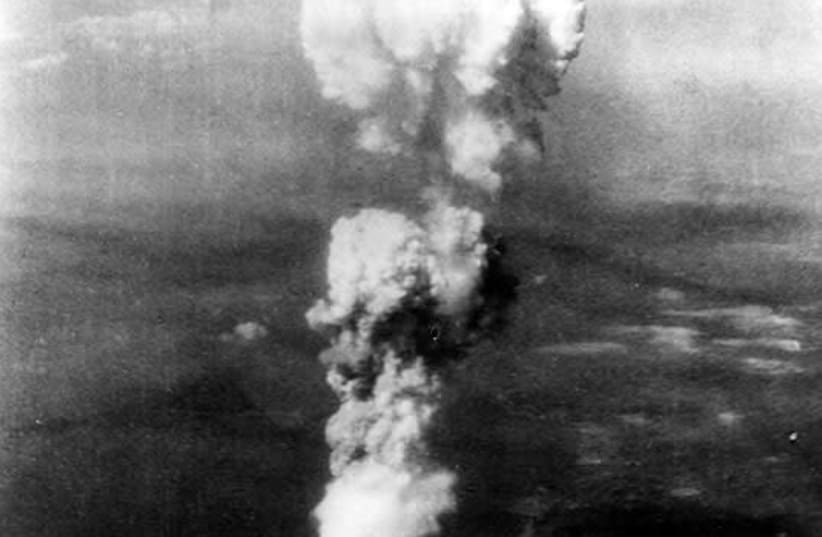August 6, 2021, marks the 76th anniversary since the US Army dropped an atomic bomb on the Japanese city of Hiroshima in World War II, the first-ever use of nuclear weapons in war and against a civilian population.
The nuclear weapon itself, dubbed the "Little Boy," was dropped by the Boeing B-29 bomber Enola Gay on the city, striking the city with an unprecedentedly powerful 15 kilotons of TNT. The destruction was widespread in the city with tens of thousands of people dead as a result.
Official figures at the time suggested that around 66,000 people were killed, of which 20,000 were said to be Japanese soldiers. However, 69,000 people were immediately injured, and the number of deaths continued to mount over the following years due to either injury from the explosion itself or from severe radiation-related diseases from the nuclear fallout.
It was later estimated that some 146,000 people in Hiroshima died.
The bomb itself was the culmination of the Manhattan Project, a secret US military project conducted by famous scientific minds like Albert Einstein, Niles Bohr, and Robert Oppenheimer.
Developed under the administration of then-US president Franklin Delano Roosevelt, the project was finished and the bombing was carried out under the administration of then-president Harry S. Truman as a means of ending the war.
The war in Europe had already ended in May with the surrender of Nazi Germany, and the US had made great strides against Japan in the Pacific theater, but an invasion of the Japanese mainland was considered too costly, with the Japanese having already an intense defensive operation to counter a land invasion. As such, the nuclear bomb was seen as a way to avoid further Allied casualties.
The decision to use a nuclear weapon was not one Truman took lightly and insisted that the target not be Tokyo but instead Hiroshima, a city of considerable industrial and military significance because he insisted the target be a military target, as noted in Truman's diary.However, archive footage shows pre-bomb Hiroshima as a bustling, thriving city of trilby-topped gentlemen boarding trams, ladies dressed in elegant kimonos, and uniformed schoolchildren walking beneath cherry blossoms overhanging shopping streets.
After the blast, rubble and contorted metal stretch almost uninterruptedly to the horizon. Electricity poles and bare trees accompany the dotted handful of windowless buildings which appear to have withstood the impossible.
The bombing followed the issuing of the Potsdam Declaration on July 26, which saw the US demand Japan surrender, and the refusal to do so would result in "the inevitable and complete destruction of the Japanese armed forces and just as inevitably the utter devastation of the Japanese homeland."
Following the Little Boy being dropped on Hiroshima, the Enola Gay would drop another atomic bomb, dubbed "Fat Man," just three days later, on August 9, this time on the city of Nagasaki, which later resulted in Japan surrendering days later, finally ending the bloodiest conflict in human history.
The dropping of the nuclear bombs on Japan heralded a major paradigm shift for the military and geopolitics as a whole, with nuclear weapons and deterrence becoming a major part of the Cold War between the US and the Soviet Union in the decades that followed.
Several nations around the world maintain an arsenal of nuclear weapons to this day, and they remain a major topic on the world stage, particularly in the Middle East, with Iran widely believed to have been working for years to develop nuclear weapons.
The bombing of Hiroshima is honored annually in a solemn ceremony in the city, and this was no exception in 2021, while Japan also hosts the Olympic Games.
However, Japanese Prime Minister Yoshihide Suga was forced to apologize on Friday after accidentally skipping parts of his speech at the ceremony, having accidentally skipped over a page.
The skipped parts included Japan being the only nation to have suffered an atomic bombing and its mission to achieve a world free of nuclear weapons, according to Kyodo News.
The error attracted attention because of the solemnity of the event, held each year to remember those who died from the blast. Suga is already under pressure from critics for going ahead with the Olympics amid a surge in COVID-19 infections.
Reuters contributed to this report.
